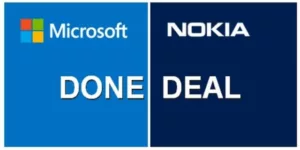Microsoft has officially announced that the Nokia Devices and Services business acquisition has been completed. The $7.2 billion deal was announced last September but it’s taken a bit longer than expected to dot all the ‘i’s and cross all the ‘t’s (namely untangling some patent licensing issues in China). Integration of the two companies is expected to take 18 to 24 months.
So now that Microsoft has its very own handset company what are they going to do with it?
Well, obviously they are going to start manufacturing phones – phones running the Microsoft Windows Phone OS, of course. Now if you look at the current numbers of mobile OS market share Microsoft is trailing Android and iOS by quite a margin but they have managed to surpass BlackBerry. And even a small percent of a multi-billion dollar market is nothing to sneeze at.
According to IDC figures, Windows Phone is the fastest-growing platform among the leading operating systems, with a year-over-year increase of 91 percent. And in a press release former Nokia President and CEO Stephen Elop (who will head up the Microsoft Devices Group as the division’s executive vice president), stated that the deal provides Microsoft one path for further growth in the post-PC world.
Elop said, “the vast majority of people [on earth] do not have, nor will they ever have a personal computer. Microsoft now has the opportunity to introduce ‘the next billion people’ to connect to the Internet and to Microsoft.” Microsoft plans to do this by “targeting the affordable mobile devices market, a $50 billion annual opportunity.”
If they can pull that off then the $7 billion they paid for the Nokia assets doesn’t seem so bad. Of course, according to an article on the ars technica website (www.arstechnica.com) “Redmond is paying about $5 billion for the Nokia division, now named Microsoft Mobile, and some 8,500 design patents. The software giant is also paying another $2 billion for a ten-year license for 30,000 utility patents, with an option to renew the licenses in perpetuity.” And patents equal licensing fees (or at least the opportunity to sue somebody else down the line).
Of course, that sword cuts both ways. You can almost bet your ring tone that within minutes of Microsoft launching any new device Apple and Samsung will file a truckload of lawsuits against them simply because…well, that’s what Apple and Samsung do.
In any case, mobile developers should keep an eye on Windows Phone as it continues to gain market share. Developers should also keep an eye on which market segments any new Microsoft devices might be attracting (people in third-world countries without running water or bank accounts aren’t necessarily going to want stock portfolio management apps).







